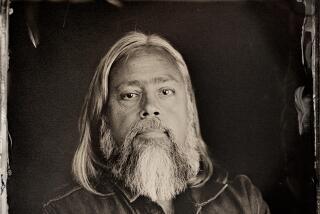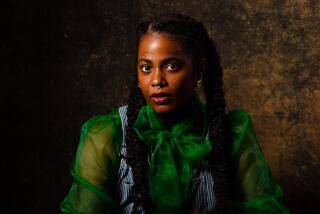Book review: ‘Revolution: The Year I Fell in Love and Went to Join the War’
Revolution
The Year I Fell in Love and Went to Join the War
Deb Olin Unferth
Henry Holt: 212 pp., $24
In the 1980s, Central America was astir with civil unrest, in Guatemala, El Salvador, Nicaragua. While nation-states and their proxies intervened in various ways, individuals too got in on the action: thrill-seekers, hope-filled Communists, those inspired by the liberation theology movement in the Catholic Church. Eighteen-year-old Debbie Olin was one of the last group, sort of.
In 1987, Debbie, a college freshman, dropped out with George, her senior boyfriend; the two headed south to join the revolution. That was a serious move, but the book is full of wry humor, not sloganeering, with a breeze of melancholy passing through the space where heartfelt belief had been.
There were so many things back then to believe in, needing to be believed in wholly: the Communist ideal, the Christianity she’d recently espoused, and George, who brought her to Central America in the first place.
“He never swore, never took drugs. At a party he was the one in the corner bending the lamp into strange shapes,” she writes. “He wasn’t outgoing and he wasn’t a leader. He was a prankster, but all his pranks were private jokes. I was the only one who laughed. To me, George was spectacular, misunderstood, brilliant.”
He was also a Christian, of the liberation-theology stripe, and falling for him made Debbie quickly slough off her Jewish-atheist upbringing. Throughout their Central American travels, she and George interviewed people about ideology and religion, ostensibly for his senior project. Using connections from his mother’s evangelical church back in the U.S., they found work at an orphanage in El Salvador.
Simply entering war-torn El Salvador was dangerous, and it fell to Debbie, who was fluent in Spanish, to answer soldiers’ questions. “I didn’t want to do the talking,” she deadpans. “I’d mess it up and get us killed and then get blamed for it.”
Unferth reveals these feelings as the concerns of a younger girl not wanting to take responsibility for a date gone wrong. Of course, the stakes were much higher: She and George were often held at gunpoint, in places where killings were frequent.
What makes this memoir so enjoyable is that she’s less interested in highlighting the dangers they faced than exploring, with quiet understatement, her state of mind while facing them: conflicted, frustrated, confused, even wrong-headed.
She was very much in love, but also beginning to feel that the life they were living wasn’t right for her. Nevertheless, she and George got engaged. “Not everything is explainable by something else. You can love something and be afraid of it. You can want someone and want to run away from wanting them.”
The two left El Salvador — which was probably for the best — and landed in Nicaragua. “The two countries were nothing alike,” she writes. “El Salvador was your basic mail-order military dictatorship: terror and torture, stuttering civilians. Nicaragua was more like a cheerful Communist kazoo concert.” With supplies for the Sandinista regime coming from the Soviet Union, left-leaning foreigners — Internacionalistas, they were called — flocked to the country, some lending real support, some holding inappropriately festive rallies.
George and Debbie found work building bicycles, then lost it. They spent afternoons at a local restaurant filled with other wannabe revolutionaries, debating politics and ideology and religion.
Just as her story begins to take the shape of other expat narratives, it starts to unwind. The short chapters fall out of chronological order. Each of them has sickness and drastic fevers. They get unengaged but stay together; their connection frays. They are broke, they are hungry, she is assaulted, he is robbed. It is a shifting story of unbecoming, of unmaking, of things that can’t sustain the hope vested in them.
Their relationship sustains the transition back to the U.S. but eventually falls apart. When she breaks with George, she recites the cliché of wanting to find herself. But, she writes, “It would turn out to be harder to find myself than I expected because so little of me existed to begin with.”
Unferth’s unusual memoir is written with a lightness and distance that allows the book to breathe, yet by its end it has settled into a new seriousness. We learn, in short episodes, that she returns to Nicaragua again and again, for a stretch of years, seeking something she can’t name. And in writing this story, she searches out George too — a quest that provides the book with a closing mystery.
There is something in Unferth’s combination of spare language and intelligent observation, her darts of emotional insight shooting through a highly personal screen, that is reminiscent of Joan Didion. That’s a lot to live up to, but the two writers share a sense of beauty and loss and get something on the page that implies something else just out of reach.
Unferth can also be disarming. Writing of her time in the unrest of Central America: “Nineteen eighty-seven is the year I did nothing. The year I fought in no war, contributed to no cause, didn’t get shot, jailed or injured.... We didn’t starve, didn’t die, didn’t save anyone either…. We had absolutely no effect on anything that happened. The only thing that changed as a result of our presence was us.”
More to Read
Sign up for our Book Club newsletter
Get the latest news, events and more from the Los Angeles Times Book Club, and help us get L.A. reading and talking.
You may occasionally receive promotional content from the Los Angeles Times.









